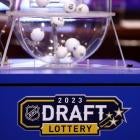The Tampa Bay Lightning are dead.
After finishing the regular season with a record-tying 62 wins, the Tampa Bay Lightning exited the playoff picture with barely a whimper. One of the most dominant teams of the modern era was swept -- and swept pretty handily -- by a franchise that had never previously won a playoff series in it's nearly 20-year existence.
There's no question that it's one of the most stunning upsets in recent NHL memory, but also arguably in recent sports memory...period. So how the hell did it happen? Let's break down where things went oh so wrong for Tampa Bay.
- Top forwards went silent
Tampa, the best offensive team in hockey, averaged 3.9 goals per game -- nearly half a goal more than every other team in the field. They were led up front by a three-headed monster in Nikita Kucherov (128 points), Steven Stamkos (98 points) and Brayden Point (92) points, all of whom finished with 40-plus goals.
When they're on their game, it's nearly impossible to match the Lightning's front-end talent. But not only were they not on their game in this series -- they were nearly invisible. None of the three guys mentioned above recorded a single point until Game 4, when Stamkos and Point were finally able to get in the goal column. Too little, too late.
Stamkos, who led the team with 45 goals this year, had just 10 shots on net in series, getting completely blanked during a pivotal Game 3. At even strength, Stamkos was on the ice for just one Lightning goal and four goals against. As the team's captain and one of their most important players, you expect better. You need better.
Kucherov not only failed to score in the series, but took himself out of the lineup for Game 3 thanks to a suspension he earned with a boneheaded check he delivered in Game 2. Climbing out of a 2-0 series hole as the series shifts to your opponents' building is tough enough, but doing so without your best forward in the lineup for a swing game? Salt in the wound.
As for Point, who is considered to be one of the league's premier two-way players, he simply didn't do enough on either end of the ice. He had just one point in the series (a power play goal in Game 4) but also had the second-worst even strength shot share among Tampa Bay forwards (47.5 percent). He just wasn't the difference-maker that he's been known to be. None of them were.
But you also have to give credit to Sergei Bobrovsky, who became a force in net for Columbus after the opening period of the series. Bobrovsky made two massive stops in that Game 1 to prevent Stamkos from making it 4-0 and, later, 4-1.
When Bobrovsky is at the top of his game, he's an elite goaltender with an ability to be a game-changer. That's what we saw for a large chunk of this series as he helped keep Tampa relatively silent. It's why the Blue Jackets elected to hold onto him for this playoff run rather than sell him off as an expiring asset at the trade deadline, and he has rewarded that decision so far, posting a .932 save percentage through the first round.
2. Special teams
The Lightning finished the season as the league's top specials teams squad, finishing first in both power play and penalty kill percentage. You wouldn't know it based on how they played in this series.
Columbus entered the playoffs with the league's 28th-ranked power play unit but they torched Tampa's PK in round one, going 5-for-10 on the man advantage. On the flip side, Tampa's own power play unit went a measly 1-for-6 and didn't get their lone tally until Game 4.
The Blue Jackets' stunning Game 1 comeback win, which set the tone for the remainder of the series, was largely powered by their special teams. Not only did CBJ deny Tampa on their three power play opportunities, but a shorthanded goal from Josh Anderson served as the equalizer in the final stretch of the third period. About two minutes later, it was followed up by the eventual game-winner -- a power play goal from Seth Jones.
Seth Jones gives the @BlueJacketsNHL the lead!
— NHL on NBC (@NHLonNBCSports) April 11, 2019
Catch more #StanleyCup Playoff action here: https://t.co/HzlyqYgsU2 pic.twitter.com/fldVsqLfpB
We've seen so many times that special teams can provide massive momentum swings and help flip the switch on a series. After Columbus' special teams helped them win Game 1, the Lightning seemed to lose control of the series and had a crisis of confidence. They needed help getting back on track, and they could have gotten a shot in the arm from their power play unit.
Unfortunately, they didn't play well enough at even strength to earn those opportunities and, to Columbus' credit, they did a brilliant job of playing aggressive but also playing clean and not taking penalties. The Lightning only got three power play opportunities over the final three games of the series -- including zero in Game 3.
3. Injuries on the blue line
Tampa Bay's top defenseman and reigning Norris Trophy winner Victor Hedman came into the series having just returned to the ice following an apparent concussion (which was listed officially as an upper-body injury). He missed the Lightning's final four games of the regular season, but was back for Game 1.
However, it quickly became apparent that he may not have been ready to do so. Hedman looked off in the early going. He was far from the looming blue line presence he'd been over the past few years. The most glaring example came on the Blue Jackets' second goal of the series -- an unassisted tally from defenseman David Savard.
After collecting the puck with room to spare and an outlet nearby in his defensive partner, Hedman just decided to fling the puck aimlessly into the neutral zone. Savard collected and carried it into the offensive zone and easily dangled his way around Hedman before ripping a great shot past Andrei Vasilevskiy.
It was a nifty move from Savard, but Hedman decided to turn towards the boards for no discernible reason, giving the attacking player a clear path to the net.
Damn that is a BEAUTY from David Savard, around Victor Hedman no less. pic.twitter.com/qsdiMptvi7
— Brandon Murphy (@2Murphy8) April 11, 2019
It's clear that Hedman wasn't himself in the first two games, which is why he didn't play in the final two. Lightning coach Jon Cooper pulled him out of the lineup and his absence was felt on the back end.
To make matters worse, Tampa also was without Anton Stralman, another veteran top-four defenseman, in the series. Tampa Bay needed top-tier offense or top-tier goaltending to make up for those losses on the back end, and neither happened. Andrei Vasilevskiy was strong at points in net but finished the series with a .856 save percentage, which was no where near good enough.
4. Coaching
With all due respect to Jon Cooper, who is a very good coach that got the most out of this group during a tremendous regular season, he absolutely stunk behind the bench in this series.
He took far too long to pull the goalie in Game 3 as Tampa, down by one, was looking for the equalizer. He watched his team repeatedly get bullied by Columbus' aggressive forecheck and failed to make the necessary adjustments to stop the bleeding. Tampa looked extremely soft mentally throughout the series. As soon as Columbus started applying a semblance of pressure in Game 1, the Lightning folded like a house of cards. They never recovered and never led again.
Possibly worst of all is that Cooper didn't look or sound bothered by any of this.
There's a fine line between staying level-headed and showing a lack of urgency, and the distinction is very often a results game. But Cooper's demeanor in this series had to be infuriating for many Lightning fans. Even after Tampa went down 3-0, Cooper kept his polite disposition and attempted to wrap his head around the situation, finding minimal results. Nothing he said inspired a ton of confidence.
Jon Cooper on the mental state of the @TBLightning, special teams, and Game 4 Tuesday after going down 3-0 to the Blue Jackets.#TBLvsCBJ #StanleyCup #GoBolts #NHL pic.twitter.com/W1DratUYlv
— FOX Sports Florida (@FOXSportsFL) April 15, 2019
Across the hallway, here's how John Tortorella addressed his team in Game 1.
John Tortorella's fiery expletive-filled pep talk was the best Blue Jackets moment in comeback win https://t.co/Pkdfl1TCiJpic.twitter.com/E6lvZCivZP
— For The Win (@ForTheWin) April 11, 2019
Again, Cooper is a great coach -- probably a better one than Tortorella. But at the end of the day when you're down and almost out, which one of those guys are you going to play harder for? The guy who is giving you an ice pack and rubbing your tummy telling you it's going to be okay, or the guy who's visibly upset and in your face because he knows you can do better?
There's no question which coach did a better job of inspiring his guys in this series.
Cooper showed no urgency in this series and his team followed suit. After the Game 1 collapse, you expected Tampa to come out of the gate firing in Game 2 to make a statement and reclaim some pride. Instead, they laid an egg. Dropping the first two games at home, you expected them to remind everyone they're top dogs and regain control of the series. Nothing. Down 3-0 with the risk of a historically embarrassing choke job, they still came out of the gate slow.
I mean, come on... have a pulse. The most emotion that Cooper showed on the bench all series came in Game 4 after the Lightning successfully challenged an offside.
If you're a Lightning fan, you might be re-assessing how much you love the multiyear contract extension Cooper signed in March.
5. The Presidents' Trophy Curse
Just kidding. This lazy narrative is a joke, just like the Lightning's finish to this season.






















